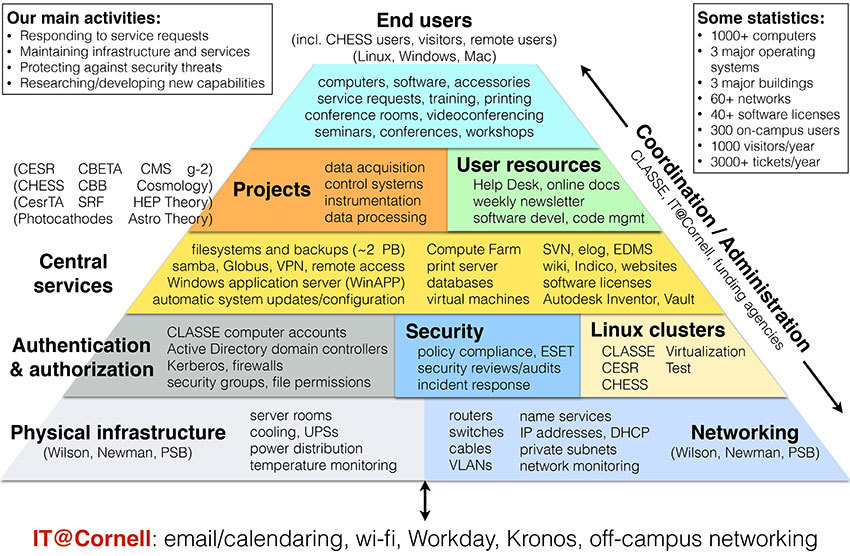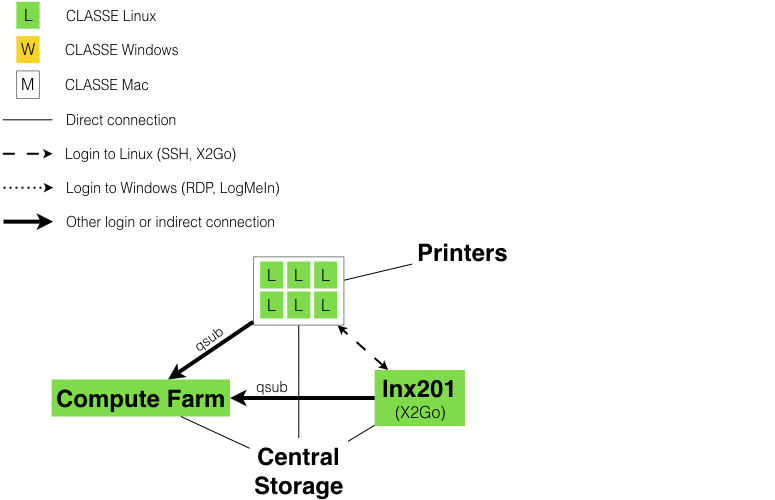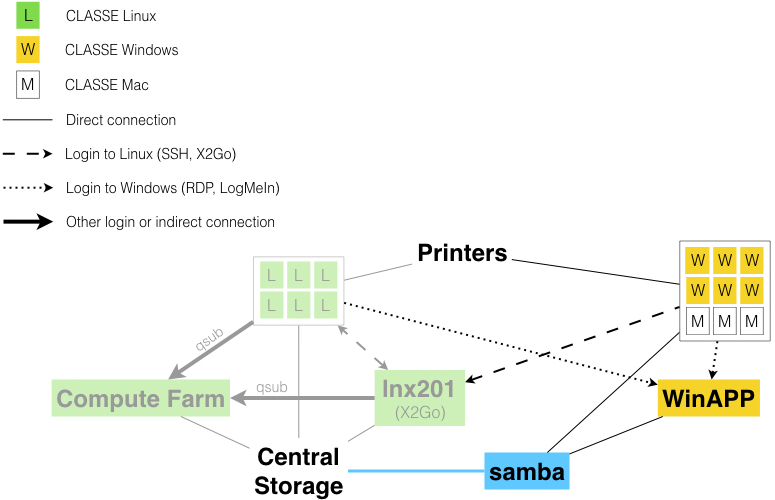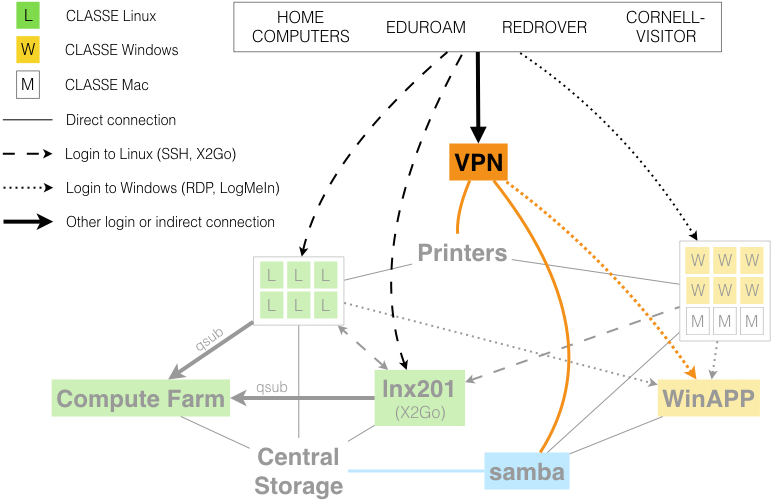.
Introduction to CLASSE-IT
- CLASSE-IT team and computing environment
- General philosophy
- User services
Who We Are
| Devin Bougie | Deputy IT Director, Linux | Mike Ryan | Web applications | |
|---|---|---|---|---|
| Bill Brangan | User support, facilities, printing | Phil Sorensen | CHESS, Linux | |
| Attilio De Falco | Software librarian, Compute Farm, Linux | Charlie Strohman | Control systems, electrical engineering | |
| Marlin Guest | Windows, Mac, networking | Werner Sun | IT Director | |
| James Pulver | IT Security Liaison, networking, Windows | Samantha Weeks | Web applications | |
| Dan Riley | Linux, networking, security | Shijie Yang | CHESS, A/V, networking | |
| Mike Roman | Mac, A/V |
What We Do
| Lab functions that we support | Examples | |
|---|---|---|
| Facility operations (on call 24/7) |
|
|
| Basic research |
|
|
| R&D for accelerators and instrumentation |
|
|
| Multi-institute centers/collaborations |
|
|
| Business and administration |
|
|
| Seminars, workshops, communications |
|
Many different uses of computing supported with one unified environment.
Our Philosophy
- We have a large and complex computing environment, limited resources, security and audit concerns, Cornell and funding agency requirements.
- Therefore,
- All CLASSE computers/software/networks are centrally managed.
- Ensures compliance with Cornell policies, makes overall support manageable.
- We provide full support only for CLASSE computers and services.
- Not personal computers or third-party services (e.g. email, calendar, wi-fi).
- We centralize services wherever possible:
- File storage, software, networked Linux systems, wiki.
- Similar model to other large facilities (Fermilab, SLAC, CERN, Brookhaven).
- All CLASSE computers/software/networks are centrally managed.
- But there is flexibility within this structure:
- We know how to support a diverse and constantly changing research program.
- Communication is essential -- please discuss your needs with us!
- We can be your collaborators.
Where To Find Help
- CLASSE-IT or outside support?: see GettingSupport
- To reach CLASSE-IT:
- Submitting service requests gives the best results.
- We work as a team, and tickets keep everyone informed.
- We get hundreds of emails/day. With a ticket, your request doesn't get lost.
- Please don't report problems to individual team members.
- Help us help you: give us as many details as possible.
- Tell us what you need and why -- the context is key.
- Let us know if your ticket is urgent. Otherwise, default max response time: 1-2 business days.
- In case of emergency:
- Page CLASSE-IT on the beamphone OR consult our CallList.
- Also submit a service request (if possible).
- Examples of emergencies: stoppage in CESR operations or CHESS data collection, paper submission deadline, broken projector for visiting speaker.
- Regular business hours:
- Monday - Friday: approx. 8:00 AM - 5:30 PM (short daily job meeting at 9:30 AM).
- Exception: weekly staff meeting Thursdays 10:00 AM - noon.
- Submitting service requests gives the best results.
- Documentation: CLASSE-IT homepage, weekly newsletter, videos
Overview of User Services
| General | Computing for research | |
|---|---|---|
| CLASSE-managed desktops/laptops | Hardware development | |
| Web browsing | Experimental control systems | |
| Printing | Data acquisition | |
| File storage and backups | Data storage and archival | |
| Productivity software | Data analysis platforms, Linux utilities | |
| Antivirus, endpoint security | Specialized software licenses and code compilers | |
| Remote access | CLASSE Compute Farm |
- Much more information at our homepage.
- Useful if you know what you're looking for. When in doubt, please submit a service request.
- Everything is designed to work together, on Linux and Windows and Mac, using one CLASSE account per user.
Some More Details On...
- CLASSE-Managed Systems
- CLASSE Computer Accounts
- Central Data Storage
- Confidential Data
- Collaboration Tools
- Installing Software
- Remote Login
- Linux and Compute Farm
CLASSE-Managed Systems
- CLASSE computers are designed to be:
- Interchangeable:
- You can log into any CLASSE system. Consistent user experience across all systems.
- Safe:
- Compliant with Cornell policies on security updates, antivirus software, locking screensavers, etc.
- Centrally connected:
- Easy access to central storage (a.k.a. samba), Compute Farm, WinAPP
- Interchangeable:
- CLASSE computers are not personal computers and not like other computers at Cornell.
- We think of them as portals to a centralized pool of computing resources.
- Things to know: SystemExpectations
- CLASSE-IT is responsible for all computers purchased through CLASSE.
- Administrative access is restricted.
- Windows/Linux: OS and software updates installed every Tuesday (early AM).
- Your computer may reboot multiple times.
- Maintains compliance with Cornell University policies.
- We can usually service your computer from afar, by logging in remotely.
CLASSE Computer Accounts
- One username/password for all CLASSE computers (Linux, Windows, Mac), web pages, VPN, etc.
- CLASSE username = Cornell NetID (if you have one)
- CLASSE password must be different from your Cornell NetID password
- More info at ClasseAuthentication.
- Change or reset your password:
- Web interface (requires access to your email)
- Other methods
- Exceptions:
- Some CHESS systems, CHESS Allstaff, legacy operating systems, Replicon
Central Data Storage
- Very important: Do not store files locally!
- Local disks on CLASSE computers are not backed up.
- Instead, use central storage (a.k.a. samba):
- Enterprise-class redundant disk arrays, capacity almost 1 PetaByte (almost 1,000,000 GigaBytes).
- Backed up on a regular basis. If you delete a file accidentally, ask for a restore.
- Home directory (1 GB) and personal user directory (2 GB) should be used sparingly.
- Most files should go in the space allocated to your project:
- Can be accessed from any CLASSE system: Windows, Linux, or Mac.
- On a non-CLASSE network, access samba through our Virtual Private Network (VPN).
Confidential Data
- Cornell defines "confidential (level 1) data" as:
- Social Security number
- Credit card number
- Driver's license number
- Bank account number
- Protected health information, as defined in the Health Insurance Portability and Accountability Act (HIPAA)
- By CLASSE policy, confidential data is not allowed on any CLASSE computer.
- If your job requires you to collect confidential data, please contact the CLASSE Executive/HR Staff Assistant.
Collaboration Tools
- CLASSE services:
- CLASSE Wiki for documentation
- Central storage (a.k.a. samba)
- XMPP chat service
- Skype: self-service download, not fully supported
- Cornell services:
- Cornell Box: good for collaboration, not for long-term storage (no backups)
- Zoom for videoconferencing
Installing Software
- If you have a software need, please submit a service request to discuss.
- We try to avoid proliferation of software, because we are responsible for long-term maintenance and license compliance.
- We might have a similar package already installed, or a different way of doing what you want.
- Cornell also requires a security review for new software purchases.
- Please review our SoftwareInstallPolicy.
- Many common packages available centrally on Linux:
- Drastically reduces maintenance overhead.
- Matlab, Mathematica, ImageJ, Opera, ANSYS, etc.
- Code development in C, C++, Fortran, Python, etc.
- Easily accessible from Windows, use central storage for files
- Windows and Mac software:
- Some packages are installed on a central Windows server (WinAPP).
- Some software available as self-service downloads (wrapped with Cameyo).
Remote Login
- For remote access to a CLASSE Linux computer:
- From Linux or Mac: SSH or X2Go
- From Windows: PuTTY or Xming or X2Go or
CLASSE_GRID.exescript. - Works both on and off CLASSE networks.
- For remote access to a CLASSE Windows desktop/laptop computer, please submit a service request.
- CLASSE Virtual Private Network (VPN)
- Access CLASSE services from non-CLASSE networks (eduroam/RedRover):
- Samba, printers, WinAPP
- Not needed for SSH, X2Go, wiki
- Video instructions
- Access CLASSE services from non-CLASSE networks (eduroam/RedRover):
- For large file transfers (100+ GB): Globus
- See also RemoteAccess for more information.
Linux and Compute Farm
- Linux is the preferred operating system at CLASSE:
- Our core infrastructure servers are running Linux.
- Standard for advanced scientific computing.
- Centralized access to software, computing resources, and storage.
- Code development: C/C++, Java, Python, Fortran, Perl, shell scripting
- General purpose login node: lnx201.classe.cornell.edu
- This is a shared resource. Please limit its use to brief interactive jobs.
- Getting started: LinuxIntroduction
- Also, Linux for beginners: https://www.cac.cornell.edu/VW/Linux/
- CPU-intensive jobs should use the CLASSE Compute Farm
- 60 nodes and growing, can run hundreds of jobs in parallel.
- Supports interactive and batch jobs.
- Queueing system guarantees equitable distribution of resources.
Summary
- CLASSE-IT is very complex because of the many projects and communities it serves.
- Any single user or any single project only sees the tip of the iceberg.
- Our policies and practices are aimed at minimizing the degree of complexity in the system, while fulfilling the lab's research and business needs.
- We see our computing environment as a giant chessboard: each piece affects every other piece.
- Our overarching concern is to enable the research and business goals of CLASSE, and always in a sustainable fashion.
Please share your needs and feedback with us!



